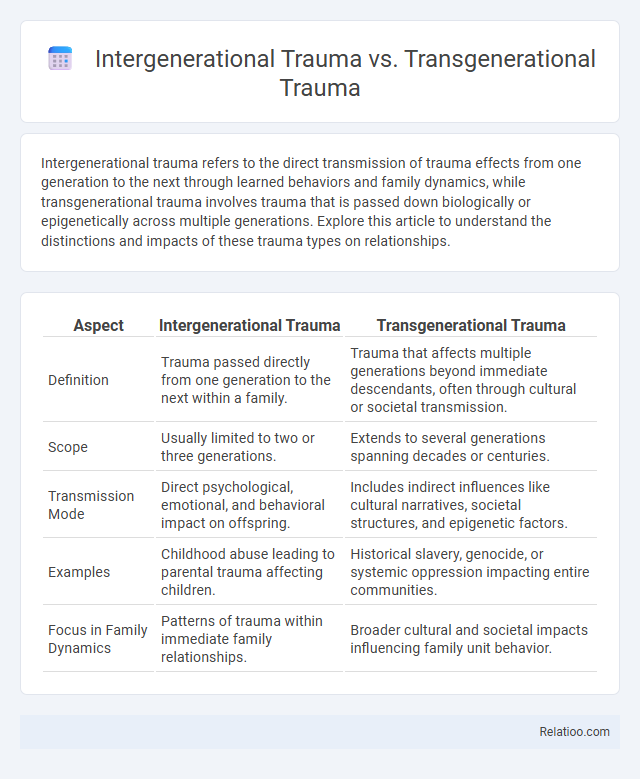Intergenerational trauma refers to the direct transmission of trauma effects from one generation to the next through learned behaviors and family dynamics, while transgenerational trauma involves trauma that is passed down biologically or epigenetically across multiple generations. Explore this article to understand the distinctions and impacts of these trauma types on relationships.
Table of Comparison
| Aspect | Intergenerational Trauma | Transgenerational Trauma |
|---|---|---|
| Definition | Trauma passed directly from one generation to the next within a family. | Trauma that affects multiple generations beyond immediate descendants, often through cultural or societal transmission. |
| Scope | Usually limited to two or three generations. | Extends to several generations spanning decades or centuries. |
| Transmission Mode | Direct psychological, emotional, and behavioral impact on offspring. | Includes indirect influences like cultural narratives, societal structures, and epigenetic factors. |
| Examples | Childhood abuse leading to parental trauma affecting children. | Historical slavery, genocide, or systemic oppression impacting entire communities. |
| Focus in Family Dynamics | Patterns of trauma within immediate family relationships. | Broader cultural and societal impacts influencing family unit behavior. |
Understanding Intergenerational Trauma
Intergenerational trauma refers to the transmission of trauma effects from one generation to another, often impacting your family's emotional and psychological well-being deeply. It differs from transgenerational trauma, which extends across multiple generations and may include collective or cultural trauma. Understanding intergenerational trauma helps identify patterns of inherited stress, enabling targeted healing and breaking cycles of trauma within your family lineage.
What Is Transgenerational Trauma?
Transgenerational trauma refers to the transmission of trauma effects from one generation to subsequent generations, often through behavioral patterns, epigenetic changes, and social environment influences. Unlike intergenerational trauma, which involves direct exposure of offspring to traumatic experiences of their immediate predecessors, transgenerational trauma encompasses the inherited psychological impact even when descendants did not directly experience the original trauma. Research in epigenetics and psychology highlights how unresolved trauma in ancestors can manifest as anxiety, depression, or PTSD symptoms in later generations.
Key Differences Between Intergenerational and Transgenerational Trauma
Intergenerational trauma refers to the transmission of trauma effects directly from one generation to the next through learned behaviors, emotional patterns, or parenting styles, whereas transgenerational trauma involves trauma that skips one or more generations, often resurfacing in descendants who did not directly experience the initial traumatic event. Key differences between intergenerational and transgenerational trauma lie in the mechanisms of transmission and temporal gaps, with intergenerational trauma typically manifesting through direct familial interactions and transgenerational trauma through epigenetic changes or unresolved collective trauma influencing later generations. Understanding these distinctions helps you recognize how trauma impacts family dynamics and informs therapeutic approaches targeting your healing process.
Origins and Historical Context
Intergenerational trauma originates from direct traumatic experiences affecting first-generation survivors, profoundly impacting their psychological and emotional well-being, often linked to events such as war, genocide, or slavery. Transgenerational trauma extends beyond the initial victims, encompassing inherited psychological effects passed down through multiple generations via social, cultural, and biological mechanisms. Historical contexts for both include the Holocaust, Indigenous colonization, and systemic racial oppression, which reveal distinct yet overlapping mechanisms of trauma persistence and cultural disruption.
Mechanisms of Trauma Transmission
Mechanisms of trauma transmission in intergenerational trauma primarily involve psychological pathways such as attachment disruptions and learned behaviors within families, while transgenerational trauma extends to epigenetic changes affecting gene expression across multiple generations. Intergenerational trauma often emphasizes direct parent-child dynamics, whereas transgenerational trauma includes broader ancestral experiences potentially altering stress responses biologically. Understanding these mechanisms highlights the complex interplay of environmental, psychological, and biological factors in perpetuating trauma across generations.
Psychological and Biological Impacts
Intergenerational trauma refers to the transmission of psychological distress and behavioral patterns from one generation to the next, primarily through learned behaviors and family dynamics. Transgenerational trauma extends beyond immediate familial lines, involving biological impacts such as epigenetic changes that affect gene expression and increase vulnerability to mental health disorders. Your awareness of these distinct psychological and biological mechanisms is crucial for understanding the full scope of inherited trauma and developing effective therapeutic interventions.
Cultural and Social Implications
Intergenerational trauma refers to the transmission of trauma effects from one generation to the next through direct personal experiences, while transgenerational trauma encompasses trauma passed down through multiple generations, often deeply embedded within cultural narratives and collective memory. Cultural and social implications of these traumas include disrupted identity, erosion of traditional practices, and ongoing social inequalities, impacting community cohesion and mental health across generations. Your awareness of these distinctions can enhance understanding of how historical trauma shapes present-day social dynamics and informs culturally sensitive healing approaches.
Assessing Trauma Across Generations
Intergenerational trauma refers to the transmission of trauma effects from parents to offspring, often observed through behavioral patterns and psychological symptoms. Transgenerational trauma extends beyond direct descendants, encompassing trauma passed across multiple generations via cultural, social, or epigenetic mechanisms. Assessing trauma across generations requires comprehensive evaluation of familial history, psychological assessments, epigenetic markers, and sociocultural contexts to identify persistent trauma impacts and develop effective intervention strategies.
Approaches to Healing and Intervention
Approaches to healing intergenerational trauma emphasize therapy models that integrate family systems and culturally sensitive practices to address inherited emotional wounds across generations. Transgenerational trauma intervention often involves community-based healing, narrative therapy, and acknowledgment of historical and collective trauma impacting multiple societal layers. Intergenerational trauma healing prioritizes holistic methods combining mental health support, educational programs, and restorative justice to break cycles of trauma passed from ancestors to descendants.
Moving Forward: Building Resilience in Future Generations
Intergenerational trauma refers to the transmission of trauma effects experienced by one generation to subsequent ones, while transgenerational trauma extends beyond immediate descendants, influencing multiple generations. Understanding these distinctions helps you implement targeted strategies for breaking harmful cycles and fostering resilience. Building resilience in future generations involves promoting open communication, cultural healing practices, and trauma-informed support systems that empower individuals to overcome inherited challenges.

Infographic: Intergenerational Trauma vs Transgenerational Trauma
 relatioo.com
relatioo.com